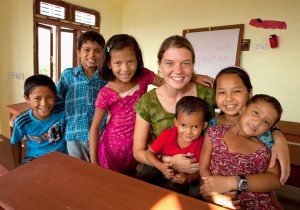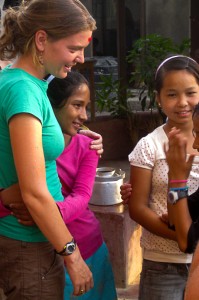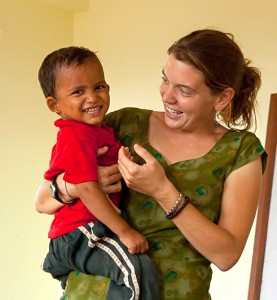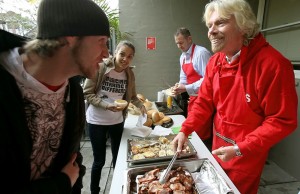The other night, Maggie Doyne of Blink Now, became the CNN 2015 Hero of the Year.Maggie is a 29 year-old American woman, who has 50 kids and lives in Nepal!
Maggie’s story and the path she decided to take early on in life, has touched the hearts of people around the globe and changed the lives of hundreds of Nepalese women and children.
Maggie was a high school classmate of my daughter, Erin. After graduation, Maggie decided to take a gap year and travel before heading off to college. Eventually, she ended up in Nepal and saw a country devastated by 10 years of civil war and thousands of orphaned children left in its wake. She used her babysitting savings to buy property and build a home for herself and orphaned children – she was 19 years old. Maggie has 50 children now, has built a primary school for 250 kids and is currently building a high school.
When Maggie accepted the Hero of the Year award the other night, she said; “ And to all of you in this room and who are watching, please, please remember that we have the power to create the world that we want to live in”. She’s done just that and has inspired countless others, to do the same. She inspired my daughter and I to seek out other individuals all over the world who were creating positive change and to make a filmabout them, with the hopes it would inspire others to make a difference.
Imagine if we all thought like Maggie and believed we all have the power to create the world that we want to live in. The fact is we do have that power. It starts with the little things we can do – in our own lives, in our family’s lives and in our communities. Small things have a way of growing into big things. When you educate one child, you change a life that has the potential to change other lives.
Maggie, you continue to inspire me. You are a bright light in a troubled world and a beacon of hope. Congratulations for this well deserved honor.
If you’d like to watch Opening Our Eyes, a film about Maggie and other change makers, you can view it here.
Tom and I will be headed out tomorrow morning at the crack of dawn. We’re bound for Chicago to spend Thanksgiving with our daughter Erin, her boyfriend Bryan and his family. For me, it’s also a welcome road trip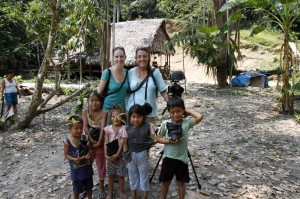 and a journey home to my birthplace. It’s funny how things have a way of coming full circle. I was born in Chicago and left to head “East” with my parents and family when I was a young child. But for someone like me, who has moved more than a dozen times in my lifetime – Chicago feels like home. It’s where my roots are.
and a journey home to my birthplace. It’s funny how things have a way of coming full circle. I was born in Chicago and left to head “East” with my parents and family when I was a young child. But for someone like me, who has moved more than a dozen times in my lifetime – Chicago feels like home. It’s where my roots are.
I’ve been a bit of a “rolling stone” over the years, but I’m also extremely grateful that I have been able to share many of life’s incredible experiences and travels with Erin and my husband Tom. It’s been a gift, to be able to combine my passions with my career and family. This Thanksgiving I am mindful of my blessings and am most grateful for what I have.
One of the things I am most proud of is the creation of the film, Opening Our Eyes, that I made in collaboration with my daughter. The journey in and of itself was rewarding, but I have found that sharing it has not only inspired and motivated others to create positive change, it has also enriched my own life.
If you would like to see the film or share it with others over the holidays, we are now offering it online. We are also offering a Thanksgiving special.
Click here and use the coupon code “THANKSGIVING2013”.
I’ve been to dozens of screenings over the past year, at film festivals, schools and community gatherings around the country and everyone always asks the same thing: “What can I do? How can I get involved?”  And that’s exactly what Erin and I hoped for when we created the film, that people would be inspired and moved to take action.
And that’s exactly what Erin and I hoped for when we created the film, that people would be inspired and moved to take action.
So, we have changed the Opening Our Eyes website so that we can help answer that question instead of being a dead end. I wanted the film to be a jumping off point for people to take action, but that would only happen if we could direct that energy into tangible ways.
We’ve set up a “take action” page, with three different sections on ways that you can help make a positive difference in your community or on a more global scale. You can “become the power of one” and find out how Maggie Doyne used her babysitting earnings to make a difference or find explore volunteer travel opportunities. You can “multiply the power of one” and donate to our subjects’ causes or find out about volunteering for them or you can host a screening of the film and “showcase the power of one.”
Every time I start to step away from this project, something happens to pull me back into it. So I suppose that this journey isn’t over. I continue to be amazed by the collective power we all have in making change happen and making our world the world we want to live in. I still remember what one of our subjects, Robbin Moulds told us one rainy day in Sydney, Australia. She said, “At 211 degrees water is hot. At 212 degrees it boils. That’s a one degree difference.”
I challenge you all – what’s a one degree difference you can make?
I’ve been to quite a few screenings over the past year of our feature documentary, Opening Our Eyes and it has been an interesting experience. What I love the most are the questions and comments that come up in the Q&A after the screening. The most asked question is “How did you pick your subjects for the film?”
I could write an entire bog about how we picked our subjects (and may have already), but the simple answer is that I sent out an email to everyone I knew asking them if they knew or knew of people – individuals – on all 6 continents – who were making a positive difference in the world. The response was overwhelming and I still have folders of subject ideas that I would love to do short stories about if I can find the funding and the time.
My daughter and I waited until we got back from our round-the-world trip to decide on our North American subject(s) and ended up shooting that segment 4 months later. Surely we were in a different frame of mind and it shows in the piece – it’s a big edgier and less optimistic, but then again it is a story about two women, Maureen Taylor and Marian Kramer, 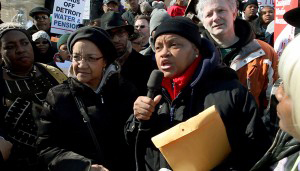 working against all odds in the inner city ravages of Detroit. They are volunteers and street activists – the “voice” for the poor and disadvantaged of their community.
working against all odds in the inner city ravages of Detroit. They are volunteers and street activists – the “voice” for the poor and disadvantaged of their community.
Many times when I’ve screened the film, folks want to know why I chose that story to be in the film and some tell me I should take it out – but I won’t. We have edited this segment when we cut the film from 76 minutes to 61 minutes. In the process, we “toned it down”, but I didn’t do that to appease the crowd, I did it because our subjects were good and caring women who were passionate about their cause and I wanted the audience to like them. I also wanted the audience to listen to what they were saying, rather than get defensive and tune them out.
Ultimately the Detroit segment has what every good story needs – conflict. But it also has hope for a better future. This segment is different from the other stories in the film, in that it’s not about giving children and teens a home, or rescuing food or saving the environment, but it is about something that is equally important and that is giving the people a “voice”. Without that, there is no hope for hundreds of thousands of disadvantaged people in America.
Being able to have our voice heard is perhaps the most important privilege we have as citizens of this country or any country for that matter. If our “voice” gets silenced, or restricted, the rest of our freedoms will be in danger. Maureen and Marian understand the importance of using their voice. I do as well, and that’s why that story “stays in the film”.
We honor Dr. Martin Luther King Jr. today. Much has been written about King, but most of my impressions of this great man were made when I was a young teenager. I remember many of his great speeches and his marches, but what I remember most is thinking – how could one man be so full of love amongst all the hate in the world.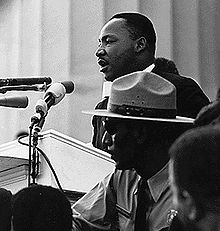 It was a tumultuous time in America, a time when the country was deeply divided by race and the Vietnam War and yet King was so full of love.
It was a tumultuous time in America, a time when the country was deeply divided by race and the Vietnam War and yet King was so full of love.
Dr. King was a gifted orator and I could fill endless pages with quotes, but I’ll site a couple that stand out to me:
“I have decided to stick to love…Hate is too great a burden to bear.”
And
“Forgiveness is not an occasional act, it is a constant attitude.”
These both go hand in hand because if we can’t forgive, whether it be the people who have hurt us or ourselves for the hurt that we’ve inflicted upon others, we will continue to harbor hate inside. I agree with King that it’s far better to stick to love because hate is too great a burden to bear.
It’s hard to forgive. To be able to forgive, one must come to terms with what or who has caused your heart to fill with hate or resentment. Sometimes in our attempts to bury our pain, we try to dismiss or deny that it’s there. But that doesn’t free our souls from the negative energy that hatred breeds – it only buries it deep inside us and consumes our spirit.
To “stick with love” is to recognize that humans are not perfect and when someone portrays their “ugly” side, which is generated by ego and fear that ultimately it’s better to see past the ugliness and notice the good. The funny thing about love is that when one person starts by treating another person with love instead of contempt, it gets paid forward and the love spreads.
“Hatred paralyzes life; love releases it. Hatred confuses life; love harmonizes it. Hatred darkens life; love illuminates it.”
Dr. Martin Luther King Jr.
Once again, I try to make sense of another senseless act of violence – this time one that snuffed out the lives of 20 innocent children. Every time there is another tragedy caused by guns, we question our firearms laws and vow to do something about the “problem”. The usual discussion takes place with lots of talk on both sides of the issue and then dissipates – until the next tragedy.
I think the “problem” goes beyond the discussion of a “right to bear arms”. I think it speaks to a greater problem and that is how we deal with our fellow man.
Too often we judge others without knowing much about their circumstances. Too often we seek to be understood but don’t place importance on seeking to understand someone else. I think this happens when we become too insular – when we don’t allow ourselves to become in tune to the rest of the world or even our own communities.
Some simple thoughts on how we can become more compassionate:
- Seek to understand – not just to be understood. I wish I had a dollar every time someone said to me “my point is…….” – I would be rich. Every time you are tempted to make “your” point – also make an attempt to understand someone else’s.
- Learn to forgive – Human beings are far from perfect. They do things and say things they usually wish they hadn’t. When we forgive others for the hurt they’ve done to us, we free ourselves from the pain as well. When we don’t forgive, we keep the negativity inside. It ends up consuming us. Try forgiveness instead.
- Don’t judge others – There’s an old saying “people who live in glass houses, shouldn’t throw rocks”. Don’t judge others unless you want to be judged by them.
- Don’t bully – There are many ways people bully – it’s not always overt. Bullying really means forcing your way on someone else. When you ignore someone, you are being just as much of a bully as someone who is more aggressive. Essentially, you are no different in how you go about “getting your way”.
- Treat people how you would like to be treated. Stop and think before you speak and act. Would you like to be treated that way. I’ve never liked cliques for this reason. There’s always an exclusionary aspect to a clique. There’s always judgments being made about who should and shouldn’t belong.
- Do things for someone without the expectation of return. The rewards of giving are just that – the act of giving itself is the biggest reward you give yourself. When you do something and expect something in return and it doesn’t happen – it takes away the joy of giving.
- How many times have you told yourself that you will be more caring and giving? And how many times do you let that thought slip into oblivion without acting on it. Next time you say that – follow through.
- Every simple act of kindness adds up. Imagine if we all did something kind for someone every day. Just imagine.
- Look past the someone’s exterior. It’s hard sometimes to look past the actions of someone. We end up questioning and taking things personally when in fact many times someone’s actions have nothing to do with us
- Live a compassionate life and teach your children through your actions what that means. It starts there. Showing compassion is one of the best ways to make our world a better place. You will set an example for your children and they will pass that along to future generations.
What are other ways we can be compassionate?
“Compassion and happiness are not a sign of weakness but a sign of strength.” ~Dalai Lama
A couple of months ago, I was one of the trip leaders for a group of high school exchange students traveling to Colorado. 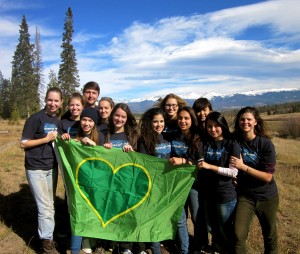 These students are here for the year and had arrived in early fall. They were placed with host families all over the country, but they had decided to go on one of the trips that CCI Greenheart, their exchange sponsor organization (and where I work), offers throughout the year. The trips are a mix of fun activities and volunteering, where they can learn about community service and meet other exchange students from around the globe. This particular trip was to Snow Mountain Ranch in Granby, CO, up in the mountains outside of Denver. And I was lucky enough to be selected as one of the people to lead the trip.
These students are here for the year and had arrived in early fall. They were placed with host families all over the country, but they had decided to go on one of the trips that CCI Greenheart, their exchange sponsor organization (and where I work), offers throughout the year. The trips are a mix of fun activities and volunteering, where they can learn about community service and meet other exchange students from around the globe. This particular trip was to Snow Mountain Ranch in Granby, CO, up in the mountains outside of Denver. And I was lucky enough to be selected as one of the people to lead the trip.
Every day was packed with activities. Each morning we would hike up into the mountains to take in the beautiful scenery, and after lunch we would do a volunteer project or other fun activity like zip lining. In the evenings, we would have workshops where we would talk about what it means to be a volunteer and how we can get involved in our communities.
One of the nights, we showed the film. This was a new experience for me, as I had not yet been present for a screening of the film to such a young audience. I realized, as I sat there watching with the students, that this was one of our target audiences. These were the types of people that we most wanted to reach – the young people who have the energy, optimism and lives ahead of them to create their own path and make a difference in what they’re passionate about. Not only that, but they were also an international audience. They represented 9 different countries, 9 different places where they could spread the messages of the film. I felt a little nervous as I waited for the film to end, anxious to hear their comments.
After the film ended, we sat in a circle and I asked some discussion questions. What traits did the subjects share? What were some of the challenges they faced and how did they overcome them? What was the role of the volunteer in some of these stories and how much did the subjects depend on them? They had some good answers, but it wasn’t until I asked each of them to say two words about how the film made them feel that the best thoughts were shared. Here are some of my favorites:
“I would say ambitious and proud. I’m proud of just knowing that people in the world are doing things like that.” – Yumna (Morocco)
“It makes me feel like I have the right ideas.” – Oleksandra (Ukraine)
“Thoughtful because it makes me think about it, and also have motivation and courage to start something. If people like that can do it, why can’t I? I mean, anyone can do it if you have the courage.” – Maxime (Switzerland)
“Kind of amazed because you don’t really see that around my area and it kind of makes me think about my future and things that I can do, and I want to do something.” – Lorraine (Upstate NY)
“Hopeful and unbelievable. You just live only once.” – Gulzhan (Kazakhstan)
It was an honor to show the film to such a bright group of motivated people from around the world, ready to make a difference. That is what it’s all about.
“My Voice” and not being afraid to use it. To be truthful, there are plenty of times that I’m afraid to exercise my voice, but I am much more fearful of the consequences if I don’t. There have been times when I have distanced friends or made colleagues step away from me because I have spoken up for what I feel is the right thing to do.  It is never easy but I would rather live in a world where I fight to give my protagonists the right to exercise their voices, rather than be quieted by them.
It is never easy but I would rather live in a world where I fight to give my protagonists the right to exercise their voices, rather than be quieted by them.
To be born at a time in America when all it’s people had a shot at the “American Dream”. Sadly, that has changed over the last 40-50 years. It used to be if you got an education and worked hard, you could provide for yourself and your family. That dream has become harder and harder to achieve as the gap between the “have’s” and “have not’s“ has widened. How much wealth and power is enough for the smallest percentage of Americans? And why does it come at the cost of so many? I am a true patriot of this country because I still believe that we can get back to the beliefs and principles that our country’s founders held true.
My health even though I pray each day that I remain healthy. Even though I spend a small fortune for my annual health insurance premium, it comes with a very high deductible. Because of the high deductible, it’s really catastrophe insurance and in paying the rising costs of those annual premiums, I find it very hard at times to find the necessary funds to cover the out of pocket costs for preventative care. How does that make sense in a civilized country – that only the very wealthy or the ones lucky enough to still have benefits at work can afford to maintain their health?
My family and friends. I have come to learn the true importance of having a family and a handful of friends that I know I can really count on to always be there for me. We may disagree at times and even become estranged, but it’s those “real” relationships that have weathered the ups and the downs and are my foundation.
That I have shelter, food and other basic human needs because so many people don’t. I have traveled far and wide throughout my entire life and have seen the desperate situations that some people have to live with in all corners of the world. But I don’t have to go far anymore to see first hand, homeless people and hungry children. It’s so easy to turn a blind eye to those in need and make judgments about how those folks got to that point. It’s so easy to tell yourself that there is nothing you can do about that and that you can’t possibly help all those people. But it’s really not that difficult to do even the simplest of kind acts for somebody who doesn’t have as much as you. Try it and in doing so you get so much more in return.
My vision and that I’m bold enough at times to trust it . Sometimes, it is far too easy to follow the trends and think that is the safest route to take, but in the process you end up robbing yourself from who you really are and have to offer. Whenever, I have looked into my heart and followed my path, good things follow. It may not happen immediately, and along the way the “misses” sometimes are more than the “hits”, but I know if I stay on course, it will lead to what I am meant to do.
What are your thankful for this Thanksgiving?
When Erin and I set out to make a film about ordinary individuals who were doing extraordinary things to make our world a better place, we didn’t know we would be meeting the real heroes of our world.
Each one of the people in our film is doing something that is not only courageous, but some would say, they are doing the impossible.
I suppose we could have chosen more high profile people or celebrities, but we opted to shine a light on the folks most people haven’t even heard of. That was a deliberate decision because we wanted to show what the individual is capable of.
As I watch the footage of Hurricane Sandy’s aftermath, I’m reminded of the power of the individual. I heard story after story about regular people who had put aside their own comfort and safety to go to the aid of others who were less fortunate. These stories will fade in our memories as time goes by, but my hope is that people will take notice and think about their own actions.
It’s easy to get caught up in the hype and glitz of the world we live in, paying homage to the notables, and the large entities that have the power and money to make the biggest splash in the news. And we talk ourselves out of the little actions that we could take, telling ourselves that we could never measure up. How sad. Maybe that’s the downside of the culture we live in.
I can only hope that more people will take notice of the ordinary people and the efforts they make – not for money – not for recognition – but simply because it’s the right thing to do.
We created this film to move people to action. The actions don’t have to be huge. They could be helping a child with their homework, walking a neighbor’s dog who isn’t able to do that for herself or just listening to someone who needs a person to talk to. We don’t have to be a celebrity, have a big name or have lots of money. We just have to realize that sometimes it’s the little things we do that count and all those little things add up to make our world a better place.
Imagine if everyone did one small thing to make a difference.
I ran into someone over the weekend who I had not seen in many years. We had been good friends, but we had drifted apart, over some disagreements, that neither of us could even remember. I’m sure those disagreements seemed important at the time, but now they just seemed trivial. We both realized that we had let our egos get in the way of our friendship and instead of trying to heal the hurts that had severed our friendship – we put more angst, anger and sadness in its place.
I started thinking about the kids that I met at the Oasis Youth Network
in Sydney, Australia, when Erin and I were there, shooting this segment of Opening Our Eyes. One young man was telling his story of growing up in a broken home, with parents who were drug addicts and gamblers. He talked about stealing money for his lunch when he was a kid, and never having clean clothes to wear to school. He talked about getting into a life of drugs and crime and eventually being sent to jail, away from his children and everything that was good in his life. And then he talked about how Oasis had given him his life back and how Paul Moulds in particular had given him a “second chance”.
When we interviewed Paul Moulds for our film, he made a comment that still resonates with me to this day, almost two years later. In talking about kids who grew up in homes like the one this young man described, or worse yet, kids who were homeless and trying to scrape out some kind of life on the streets, he said: “we try to help these young people by training them and finding them a job – but who is going to be willing to hire them when they have no address, no education and no record of employment?” He went on to say that no matter, how much pain some of these kids had grown up with or how many wrong decisions they had made in their lives, that he still believed in giving them second chances. I remember thinking at the time that the world needed more people like Paul – people who believed in giving others, a second chance.
We all say and do stupid things in our lives and in the process, we end up hurting ourselves and the people we truly care about. We’ve given into our “precious egos” when we behave like that. Ultimately, many of us come to realize that we only bring more pain in our lives, by continuing to hold onto the hurts from the past, instead of letting go of our egos, and giving someone who may have done us wrong – a second chance. I think sometimes in our efforts to protect ourselves from being hurt by others, we bring more pain to our lives by shutting the door on second chances.
Jackson Browne writes, “It seems easier sometimes to change the past”. Unfortunately, we can’t change the past, but we don’t need to keep holding onto it. While it’s not easy to give someone a second chance, it feels so much better to leave the door open to possibilities. Imagine what the world would be like if we all thought like Paul Moulds, and thought that everyone deserves a second chance.
